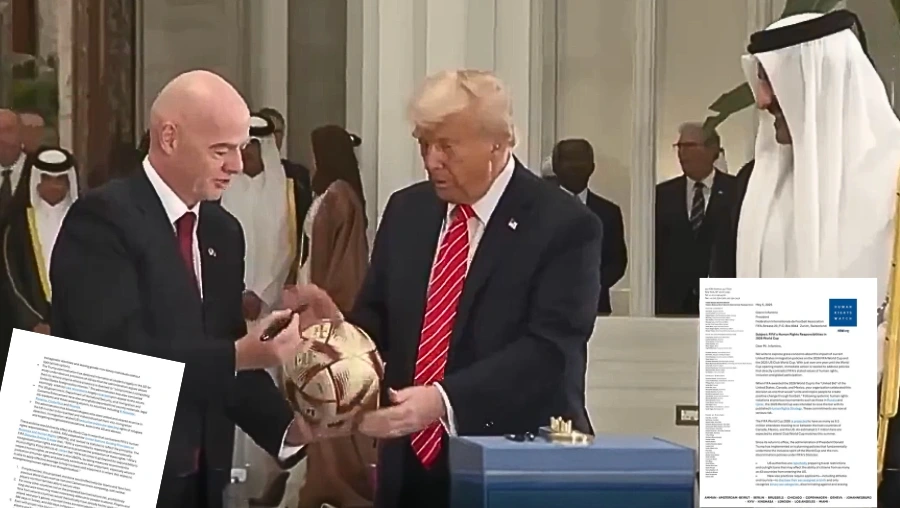What if the world's most beautiful sideshow is no longer seen as an invitation to global exchange, but as a security risk? That is precisely the scenario emerging one year before the start of the FIFA World Cup 2026. More than 90 civil society organizations, including Human Rights Watch, Amnesty International, the NAACP, and the American Civil Liberties Union, are sounding the alarm over the consequences of U.S. immigration policy under President Donald Trump. In an open letter to FIFA President Gianni Infantino, they call for nothing less than a commitment to human rights - and a clear stand against political hardening. We had access to the letters and have received some that we are publishing here. The background: On May 14, 2025, Infantino was seen in Doha alongside Trump, at a state dinner at the Lusail Palace. Officially, the event focused on investments, unofficially on symbolism. The images of the two, familiar and camera-friendly, evoked memories of FIFA controversies at previous tournaments - particularly Qatar and Russia. But this time, the host is not on the Gulf or in Eastern Europe, but in North America. And the criticism comes from within its own ranks - from democratic states, from established institutions, from the center of society.
The open letter to Infantino is precise. It not only identifies the problem but also names names: Homeland Security Secretary Kristi Noem, who has made headlines with DNA tests and nighttime deportations; Vice President J.D. Vance, who said back in May, "Everyone is welcome to watch the tournament. But when it's over, they should go home - or speak to Secretary Noem." The tone is clear, the threat unmistakable. And it is precisely this atmosphere, say the signatories, that undermines the spirit of a global tournament. Particularly concerning are Trump’s travel bans on a total of 12 countries, including Iran and Venezuela, along with his announcement to add another 36 countries - primarily African nations - to a blacklist. This policy could deny entry to hundreds of thousands of fans, players’ families, and officials - even though their teams have qualified for the tournament. The resulting complaints of discrimination, arbitrariness, and unlawful treatment, the NGOs fear, could permanently damage the tournament.
e United States is not just any host. It is a country with a deep football infrastructure, global appeal, and over 2.6 million expected international guests for the World Cup. But instead of functioning as an open house, the country is becoming increasingly closed off politically. ICE raids, arbitrary detentions, travel bans based on religion, and intimidating Facebook posts from the CBP - all of this has become the new reality. In a remarkable move, CBP even announced plans to be “suited and booted” in stadiums during the 2025 Club World Cup - a phrase that sounded more like militarization than hospitality. Only after FIFA’s intervention was the post deleted. But the extent of unease is reflected in reports of empty seats and declining tourism numbers - especially from Canada, where travel bookings to the U.S. have reportedly dropped by up to 40 percent, according to members of Congress. The central message of the letter: A World Cup is not just a logistical but above all a human rights event. Denying people access, placing them under general suspicion, or restricting their freedom of movement not only violates ethical principles - it also damages one's own credibility. This is precisely what the signatories accuse FIFA of when they speak of the risk of becoming a "PR shell for an authoritarian regime." Infantino himself declared at the FIFA Congress in Paraguay in May, "The world is welcome in America." A sentence now being put to the test. Because as welcome as players, officials, and sponsors may feel - for millions of fans from Africa, Asia, or Latin America, that is not the case. Those who encounter political arbitrariness instead of openness, those who fear deportation instead of feeling excited for the game, are not experiencing FIFA’s vision but a caricature of it. FIFA is therefore being called upon - not only in Sunday speeches, but through clear action. The appointment of a new human rights officer for 2026 is a beginning - but the job title alone will change nothing unless the organization acts. Because human rights are not a sideshow. They are the playing field on which it will be decided whether the World Cup becomes a celebration for all - or an exclusive showcase for those who are allowed to stay.




Infantino wird das genau so wenig Jucken, wie die bisherige Kritik.
Der ist genau so Dealgeil, wie Tru***.
Und Fussballfans schmeißen offensichtlich gerne jegliche Moral über Bord, wenn es um ihren heiligen Ball geht.
Das müsste hier ständig in den Medien sein.
Was mit Menschen in den USA passiert.
Aber Nein, da gibt es vielleicht mal einen kleinen Artikel, sonst wird ellenlang über die großartige (Ironie) Club WM berichtet.
Auch über die Problematik bei Einreisen in die USA hört man kaum mal was.
Wo bleibt eine längst überfälluge und deutliche Reisewarnung?
Das gehört abgesagt. Es geht doch nicht in so einem Land eine WM auszurichten. Da dürfen nicht alle Teams hin, das stelle man sich bitte einmal vor. Ich werde die WM mir nicht anschauen.